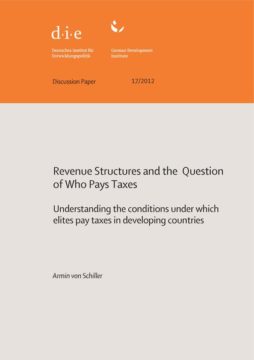Revenue structures vary strongly among developing countries. Most approaches to tax performance fail to give insights into this puzzle. I argue that much of the answer lies in the political dimension and highlight the willingness of elites to pay taxes as the most crucial factor. In contrast to common arguments stressing the relevance of external pressure in explaining tax contributions of elites, I examine how characteristics of the interaction among elites themselves are relevant aspects to take into account. The analysis has strong policy implications. In supporting the emergence of higher performing and fairer tax systems a strategy based on partly aligning with elites‘ interest and identifying positive drivers of taxation seems more efficient and promising for development cooperation than wagering on strengthening external pressure on powerful social groups. However, the preconditions for the success of these strategies as well as their potential effect on other development goals and future development paths of partner countries call for a cautious trade-off analysis.
- Veröffentlicht am Donnerstag 20. Dezember 2012 von Deutsches Institut f. Entwicklungspolitik
- ISBN: 9783889856227
- 39 Seiten
- Genre: Gesellschaft, Politik, Sachbücher, Wirtschaft
